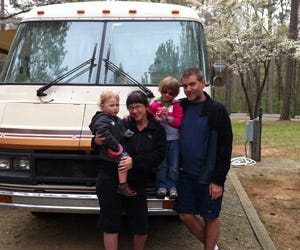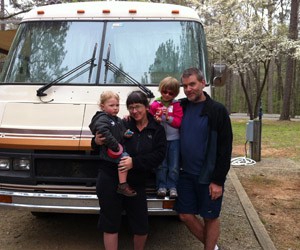A Wry Look at Camping Vehicles
Or, A Good Drive Spoiled
This piece was originally written for Gwinnett Magazine, around April of 2014.

I spent most of my outdoor life with a condescending sneer for the “campers” I saw at state park campgrounds in RVs, with their satellite dishes and HVAC units and running water. But I also spent half my life with back trouble and the past few years with kids, so over the winter my wife and I decided to acquire a camper of some kind. We reasoned that the best and safest way to experience the great outdoors with two kids who would shred a tent in minutes and would never sleep (and might possibly suffocate) in sleeping bags was, in fact, to experience it indoors, probably in a pop-up camper.
We shopped around, finding some pop-ups on Craigslist that would have been workable and others that would have probably invited divorce and financial ruin. We visited one of these in person, finding that for a mere $1500 we could buy a pop-up with one wheel, plywood walls replacing the fold-out bits, and in desperate need of meth testing.
At the last moment (for all final decisions are made at the last moment, aren’t they?), we purchased a motorhome from relatives at a great price. This drive-able home, with its toilet and stove and reasonably large beds, seemed the best solution for our family, and we got it for a steal. I don’t want to leave you with the wrong impression; our “new” RV is a 1984 Southwind with peeling wallpaper, a broken hot water heater, a water leak, an ancient microwave that cooks food without your even putting the food inside it, and the aesthetics of a seventies nursing home. And we love it.
As we plan our spring and summer of remodeling and camping, the time for judging our choice has arrived. Below are a number of options for hitting the road in convenience, if not style, that we considered. Just keep in mind that I’m writing this from the Watson Mill Bridge State Park campground while my wife and children sleep soundly in beds with central heat and food nearby that’s neither spoiling nor being gnawed by raccoons and bears. I am having a drink in the woods by a dying campfire. You, most likely, are not, so don’t judge my choices too harshly. Getting out there is the important thing, even if it means finally giving up tent cred for convenience and delayed back surgery.
TENTS AND TEARDROP TRAILERS
When I think of tent camping, I think of a youth spent backpacking. Others might fondly recall passing out in a two-man tent at a Renn Fair or the Highlands Games in fear of the imminent dawn and equally imminent paternity suit. But tent camping ain’t what it used to be. Or, more accurately, it is exactly what it used to be. Many tent campers enjoy a luxury that owes more to Out of Africa or Game of Thrones than to REI: spacious tents, comfortable cots, and high ceilings. This is “car camping” at its finest, and it’s a fine way to experience the outdoors. You won’t be trapped in a small nylon body bag when the mosquitoes and rain come, and that alone is worth a lot. The teardrop camper/trailer fad (in which a small trailer carries your gear, kitchen, and usually a tiny bed) has made car camping even more luxurious… though in some cases more expensive than you might guess.
POP-UPS AND SMALL CAMPERS
We first considered a pop-up because we could tow it without unduly stressing the notoriously fragile transmission in our Honda Odyssey. Small campers share much with tent camping, but with power and running water. You won’t want to spend a lot of time indoors in such a cramped space, but getting outside is rather the point, isn’t it? These can be towed with normal vehicles, have many of the scaled-down conveniences of home, and can be had for a few thousand dollars, plus the price of a wheel and a meth test.
TRAILERS AND TOUR BUSES
Most campers one sees at campgrounds are trailers… often large trailers, with slide-out rooms and showers and DirecTV. Where smaller campers bring to mind living out of a conversion van (minus the unicorn mural on the side), these trailers are more like living on a luxury yacht: you have everything you had at home, only smaller and more expensive. There are lots of mirrors, which increases the already outlandish sense of spaciousness. (Mirrors also stimulate the circulation when you stumble out of the shower and suddenly glimpse 52 people who look just like you in every corner of the many-cornered room.) These mobile homes are often more pricey than the mobile homes your in-laws live in, and that expense is often exacerbated by the need to buy a special vehicle to tow it. One might reasonably ask what the sense is, for example, in owning a pickup truck with a fifth wheel permanently affixed to its bed for towing your camper. Might it not make more sense to simply buy one of those converted buses that bands, political candidates, and other criminals (like that insane mobster from Justified) travel in?
MOTORHOMES
This was our choice, and is therefore obviously the best of all the options. These are heavy-duty trucks onto which New York-sized apartments have been bolted. You can drive right up to a campsite in one of these and set up house in no time. Just invest a short hour or two leveling the RV, then connect the power, water, and sewer. Roll out the awning, roll out the outdoor carpets, set out the outdoor chairs, and chock the tires so you don’t roll into a ravine while you sleep. Then undo all of this and drive around unfamiliar countryside for hours in search of the propane you forgot, cursing your “convenient” decision not to tow a car behind your motorhome. One downside is that sometimes a commercial driver’s license is required; another is that a commercial driver’s license should be required, whether it is or not. The stress of driving one of these monsters is somewhat mitigated by the immense relief you feel when you arrive at the campground and can, praise be to God, finally stop driving it.
A WORD ABOUT CABINS AND HOTELS
One might look at the expense of acquiring and maintaining a motorhome or one of these other options and reasonably conclude that it makes sense to simply stay in hotel rooms or the cabins available at many public and private campgrounds. I can’t objectively explain why camping is better, but that merely makes me dim-witted, not wrong. It’s the difference between owning and renting, the difference between having a garden and the produce section at Kroger. I have stayed in glorious, wretched shacks at Bahia Honda in the Keys and lovely cottages in the Georgia mountains. These were convenient and mostly vermin-free experiences, but they were by no means “camping.” There is very little of the experience of camping — that satisfaction one gets from battling the elements, or from conquering empty propane tanks and sewage dump stations. Perhaps the choice to camp is not the prudent one, but the alternative is to hole up in someone else’s house in the woods while the kids watch, with no sense of irony, Dora the Explorer on cable. Meanwhile, the parents do exactly the sorts of things they would have done at home, except maybe for mowing the lawn. Yes, camping is an expensive way to avoid mowing the lawn… but is any expense really too great in the service of such a cause?
